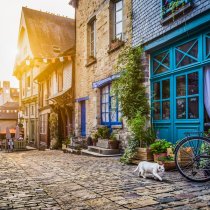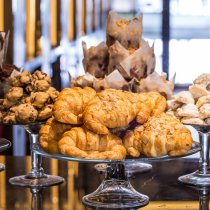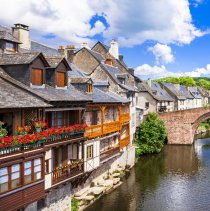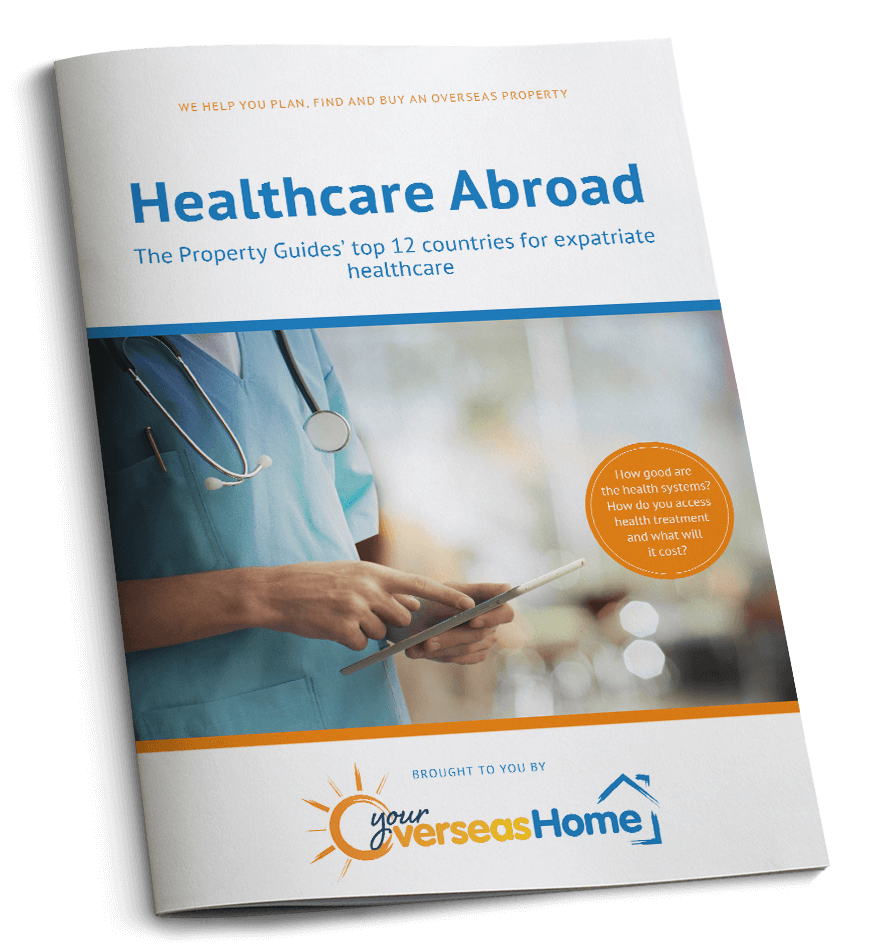With great public services and infrastructure, high quality of life, and one of the richest cultures in Europe, it’s not surprising that France is a favourite country amongst a large chunk of the expat crowd. But what exactly can you expect when living in France?
To help you find out more, we’ve put together this comprehensive guide to living in France as an expat. Whether you’ve already relocated or you’re planning on moving to France in the near future and you want an idea of the life in store for you, this should have all the information you need about life in your new home country. We’ll look at all the basics in this guide, providing both information about essential services and the French lifestyle. Here are the key topics we’ll be covering:
- French culture
- Transport
- Learning the French language
- Schools in France
- Working in France
- Shopping
- Owning property in France
- Healthcare
- Leisure in France
- Homesickness
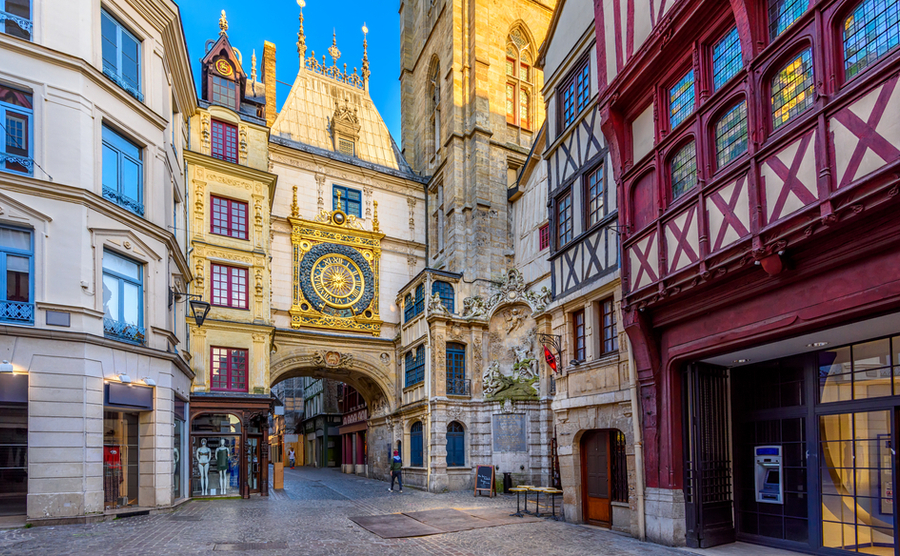
Rouen, Normandy
French culture
France is a country steeped in history and very proud of its traditions. From etiquette to food, drink and lifestyle, here are some French traditions you need to know.
Greetings
Anyone who has ever visited France knows that the greatest of all French traditions is in greeting people. From “la bise” — kissing the cheeks of people you know — to walking into a shop and addressing anyone and everyone in there with a cheery hello, it’s just simply the way of life and it is certainly not optional. The French take great pride in their manners, etiquette, and respect. Be careful though, as on first meeting it is considered rude to address someone as “tu” rather than “vous” (one must wait to be asked) and many a faux pas have been made with the greeting kiss. From attempting the incorrect cheek first to knowing (depending on region) how many kisses are required. To the unsuspecting visitor, this can be a minefield.
In rural France it is quite common to say “bonjour” (“hello”) to anyone you meet in the street. When shopping locally, you will find the same, as people greet one another and then wish each other a “good day” (“bonne journée”) when they leave. Interestingly – depending on the time of day – one may say “bon apres-midi” (“good afternoon”) or even “bonne fin de l’apres-midi” (“good end of the afternoon”) if it is around 5pm. You will start hearing people say “bonsoir” (“good evening”) around 7pm.
The language
The most important thing to know is that French is a language with formalities, and, as above, using the wrong form of “you” could possibly offend someone. If they are older than you, are your superior, or if you do not know them, use “vous”. If they are a child or your classmate, use “tu”. However, for someone more junior than you at work, still start with “vous”, as acknowledging this by calling them “tu” can be just as offensive.
In days gone by, the “vous” form was almost constantly used, even amongst families, in particular, by the upper classes, which may seem strange to us now. The two different forms of “you” exist in other European countries also, so it is important for British visitors and expats to learn the difference. If in doubt, always use “vous”, and make liberal use of “monsieur” or “madame” to address anyone working in a service job (shop assistants, train conductors), elderly neighbours, and anyone else you want to be polite to.
“Madame” and “mademoiselle” are not related to marital status, and “mademoiselle” should only be used for teenagers these days. Most French organisations have banned the use of the word in correspondence, and it is falling out of use.
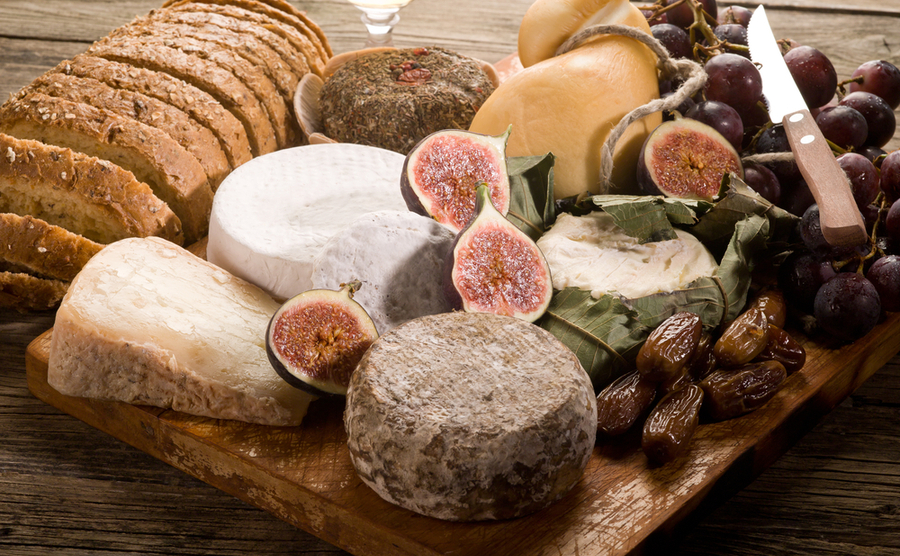
French food and drink
Eating excellent food and drinking fine wine are perhaps the greatest French tradition of all! Generally speaking, wine is served with meals rather than as a drink on its own. If you are invited for an apéro (alcoholic drink served before a meal as an appetiser) you will likely be offered a range of drinks, both alcoholic and soft.
Mealtimes are sacred in France, the whole family often gathers, spending time chatting between courses. French weddings are so much fun, with the meal often going on for several hours! Cheese is always served after the main course, which when you think about it, makes good sense since it’s savoury. Dessert and coffee will follow.
There are so many traditional French foods to enjoy in the country. Of course, there’s the classic famous French foods like French onion soup (or soupe à l’oignon gratinée), coq au vin, and crepes suzette. But after a short while of living in France, you’ll no doubt be enjoying other lesser-known traditional dishes which are still just as delicious, such as biscuit rose de reims (sweet pink biscuits) and boudin noir aux pommes, which is blood sausage paired with cooked apples — it may sound like an odd combo but it’s delicious!
Family and community
Family is much revered in France, with the different generations mixing well. Everyone feels important this way, and children grow up feeling included. The sense of community is also an important part of everyday life here, particularly in rural communities where close bonds are formed. Local events – fetes, concerts, festivals, etc – occur throughout the year. Such events bring the whole community together.
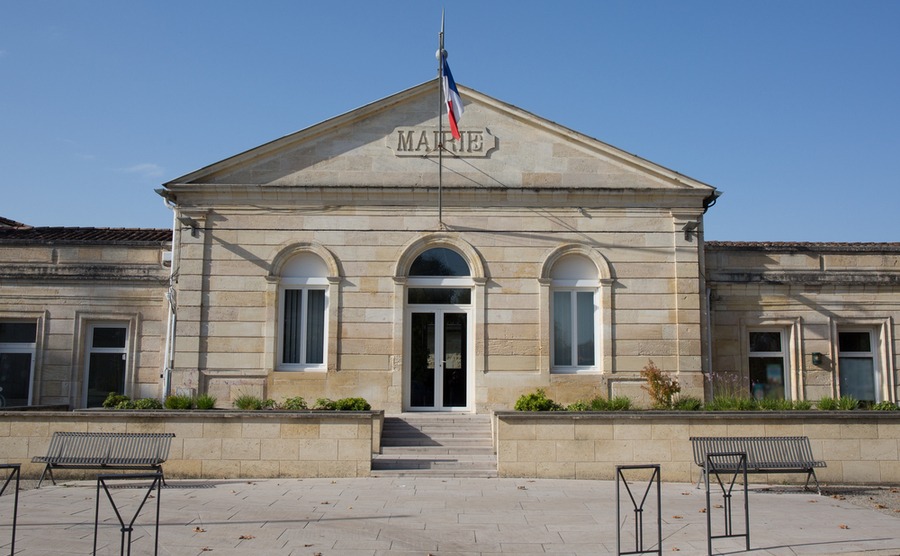
If you’re letting out your home, make sure you alert your local Mairie
The ‘Mairie’
In the UK, you may have little idea about what happens in your town hall, the purpose it serves and what to use it for. However, in France the town hall or ‘Mairie’ can be one of your first ports of call. Often the centre of town or village life in France, there are usually countless reasons to visit your local Mairie.
If living in a smaller village or commune in France, your town hall is an important and integral part of life. The remit of your local Mairie may be more far reaching than you could imagine! It is often not only courteous, but in fact prudent to check out any rules or regulations with them in advance. Many an unsuspecting newcomer has been caught out by not considering that there may be small courtesies to consider in advance of ploughing on with that list of jobs! Either way, it’s also a very good opportunity to introduce yourself and integrate into your new community.
Some of the reasons you may visit your local Mairie include:
- Property: Building projects that in any way change the outside require planning permission and acceptance through your Mairie. They can also inform you of rules and regulations regarding the hours when you can undertake noisy building work or gardening jobs.
- Local information and contacts: In smaller communes, the Maire (Mayor) is often someone who has grown up in the local area. To that end, their knowledge and network can be invaluable. They can advise on local services, such as rubbish collection days and so on.
- Disputes: Any dispute between you and your neighbours/people in the village should be quietly discussed at your local Mairie before jumping straight down the “gendarmes” route.
- Meetings: In the same way that local councils undertake decisions at town halls in the UK, so does the council of your local Mairie in France. Monthly meetings are held to discuss satisfaction/issues with services such as water, electricity, and connectivity services.
- Social events: Outside every Mairie in France is a notice board informing the community of anything of local interest. This includes anything from active planning permission requests to local groups and activities. If you’re looking for a walking group or have a specific interest you want to pursue, it is worth asking your local Mairie about this.
Each council also has a board of volunteers who, in conjunction with the municipal council and Mayor, make up the “Comite de Fete”. This group is tasked with creating and planning village events. These include local brocantes (bric-a-brac markets) and annual community events which generally involve eating, drinking and merry camaraderie. Anyone can volunteer to become part of this committee and it is indeed a fabulous way to not only integrate into your community, but to get to know the locals.
Bank holidays
Public holidays include New Year’s Day, Easter Monday, Labour Day on 1st May, Ascension Day, VE Day, Whit Sunday, and Monday (all in May), Bastille Day in July, the Assumption of Mary in August, All Saint’s Day always on 1st November, Armistice Day on 11th November, and Christmas Day.
Officially, there are 11 bank holidays are observed in France, but watch out. If you haven’t heard of the expression “faire la pont” you will soon come to understand its meaning. If a bank holiday is on a Thursday or a Tuesday, then according to French tradition, they will also take off the day separating them from the weekend creating the impression of “doing the bridge” over the weekend.
The 14th of July is Bastille Day, or “La Fête Nationale”, a very important date in the national calendar. This day marks the storming of the Bastille in France, a turning point of the French Revolution which united the people of France on 14th July 1789. Huge celebrations are held nationally as part of this celebration, including military celebrations, and is the time you will most hear fireworks ringing out. You can find out more about Bastille Day here.
A lesser-known celebration is the “fête des voisins” (neighbours celebration) on the last Friday in May annually. Another of those important French traditions is to look out for others in your commune especially those that may have no family. The idea of this is to bring people of the same neighbourhood together in the spirit of conviviality and solidarity. From small get-togethers to large street parties, this holiday is a big deal.
Then we have Christmas. Unlike the UK, the main day of celebration here is December 24th when the day builds up to a fabulous evening meal: Le Reveillon. This is a day for family and to enjoy the build-up of the anticipation of the wonderful evening to come. Tables are set ornately with candles, scatter decorations, and lights, and you may well be surprised by the wonderful tradition of the tablecloths being knotted at the corners, done in order to block the devil from joining in. A place is also often set for either “an unexpected visitor” or for “the poor”. The meal on the 24th can last for hours, with menu options differing slightly from region to region and is also the day when gifts are offered. To prepare for the traditions in your local area, check out our guide to regional French Christmas traditions.
And just when you think Christmas is over, Three Kings’ Day arrives on January 6th. The French traditionally celebrate Epiphany by baking a special cake called “la galette des Rois”, which translates to the king’s cake. A round puff pastry-based cake houses a special trinket called “une feve”, meaning a bean, and is eaten as a celebration on this day. The serving of the cake becomes a game as a child hides under the table and shouts out the name of the next person to be served a slice so there is no way of knowing in advance who will end up with the piece cocooning a tiny porcelain feve. Be careful how hard you bite into your cake and whoever finds it is said to receive instant good luck and also gets to become the King or Queen of the party as well as attaining the privilege of wearing the crown. Be careful what you wish for though, as it is also tradition that the King or Queen will then be in charge of providing the galette for the next year’s festivities.

Transport
Transport in France is generally of a good standard, especially in terms of maintenance and modernity. Getting around will pretty be easy with a very extensive public transport network. In more rural areas, like in the UK, you will need to rely on your car.
Driving in France
Driving in France presents different challenges from those in the UK. But there are plenty of positives to enjoy while exploring the country by car too. There is far less traffic on the roads and the motorways are very well maintained. Driving in France is therefore more often than not a pleasure rather than stressful.
Requirements and rules for driving in France
The most important driving rule in France (and most of mainland Europe) is that you drive on the right. By association, the main French driving law for you to be aware of is ‘priorité à droite,’ which means those driving on the right have right of way. If you bring your right-hand drive car to France, you must remember to adjust the direction of your headlamp beams. Likewise, if your car has UK registration, you must attach a sticker showing the country of origin.
When driving in France, an important requirement is that you have your driving licence, car registration papers, and insurance documents with you at all times. You must also always carry a warning triangle and fluorescent safety vest inside the main body of your car. You will be fined €90 per item if you do not have them on you.
The standard speed limits for driving in France are:
- Autoroute in good weather: 130km/h (80mph)
- Autoroute when raining: 110km/h (68mph)
- Dual carriageway in good weather: 110km/h (68mph)
- Dual carriageway when raining: 100km/h (62mph)
- Regional road in good weather: 80km/h (56mph)
- Regional road when raining 80km/h (50mph)
- Regional road in built up area: 50 km/h (30 mph)
People normally adhere to these limits. The multitude of speed cameras around mean that laws are implemented rigorously. Furthermore, there is instant licence confiscation for anyone caught travelling more than 25km/h (16mph) over the speed limit.
All drivers and passengers must wear seatbelts wherever they are sitting in the car, and you can’t use a mobile while driving. As in the UK, it’s advised not to drink alcohol at all if you are driving. The drink drive limit is lower than in the UK (0.5mg/ml). Radar is increasingly common on motorways and other major roads; you will receive a fine for driving over the limit. It starts at €68 for driving by less than 20km/h (12mph) more and rising up to €1,500 for speeding by more than 50km/h (31mph) and an automatic licence suspension of three years.
French roads
A big plus of transport in France is the excellent road network. It was built with the motorist in mind, so offers sweeping views of the countryside. Moreover, the traffic that you may be used to in the UK is uncommon, as France is roughly twice the size of Great Britain but has around the same population.
The most common roads in France are motorways (known as Autoroutes and indicated using ‘A’ and a number), trunk roads (known as routes nationales, ‘N’ and a number) and route départmentales (‘D’ followed by a number).
Most motorways in France are toll roads, and these will be indicated with the word Péage. There is no road tax in France, so the cost of the tolls is offset by this. Tolls are either charged at a flat rate or based on the distance you travel on them. Distance toll calculations come through a ticket system: you receive a ticket as you enter the road and pass it back to the attendant as you leave the road. These tolls can be expensive but are generally the only way to cover large distances in a single day.
A great tip is to opt for the “Liber T” tag which you affix to your windscreen — this automatically allows you through the tolls in the reserved section without having to fiddle around for change to pay with each time. It is simple to obtain one and you are charged a monthly fee according to how much it is used. The cost of obtaining one is minimal and when you do have a busy period with a queue of traffic waiting to go through the tolls, you will find the reserved section far less busy, thus saving time.
Public transport
Public transport in France is, by and large, very good. Train and air transport tremendous, linking the entire country, the rest of Europe and, indeed, the world.
French trains
The French train system is, for the most part, under the Société nationale des chemins de fer Français (SNCF – the French National Railway Company) highly efficient. The TGV, or Trains à Grande Vitesse, are France’s famous high-speed trains. They make transport throughout France particularly easy, serving over 230 destinations. Another operator is Thalys, which runs international high-speed trains from the east of France through to Belgium, the Netherlands, Germany and more.
Finally, there is of course also the Eurostar, connecting the UK and France. It runs from London St Pancras to Paris (and Brussels). Depending on the season, the route can extend further, including down to Narbonne or Montpellier.
There will usually be a train station in every major town. You will be able to access a wealth of information online (and in English!) to help you learn the best ways to navigate French trains and train stations. The best ones to look at are SNCF and Voyages-SNCF.
An important tip is to always validate (composter) your ticket before you get on French trains. Expats sometimes forget this, and it can lead to a fine.
Buses, trams, and metros
Paris’ metro is world-famous, but it’s not the only one in France. Lille, Lyon, Marseilles, Rennes, and Toulouse also have comprehensive systems, with generally low prices. If you’re a regular traveller, a carnet of several tickets or an abonnement (pass) can be a cheaper option.
Bus transport in France is highly variable depending on the location. Most charge a set rate for a single journey – you often won’t find return tickets. With both French bus and metro systems, you will generally need to validate your ticket, in this case in the machine on board.
25 cities still have the tram system, known as tramway in French. Montpellier, for example, has an overground tram network with each one coloured according to the route, and you can buy tickets easily at the tram stops. Strasbourg has a very modern system. You’ll also find them in other urban centres, including Toulouse, Lyon, Bordeaux, and Orleans.
Flying
What may surprise you is the sheer number of airports there are in France: 170 in total across the country. This is the highest density in Europe. There are 358,000 inhabitants in France per airport – compared to the 1.2 million inhabitants per airport in the UK. In most major expat locations, you will find there are at least five airports. Normandy, for example, has Caen, Deauville, Rouen, Le Havre, and Cherbourg, while Languedoc-Roussillon has Carcassonne, Beziers, Montpellier, Perpignan, and Toulouse.
Learning the French language

The key to successfully settling into your new life is learning French. Without it, you’ll never be able to truly integrate. Once you know the language, a wealth of social and work opportunities opens up. So, give it a try – and don’t be too worried about mistakes!
The importance of learning French
A lack of communication skills and the feelings of isolation this brings are often stated as the number one reason that British expats return to the UK. Learning a little of the French language will truly help you as you begin to integrate. Imagine, for example, if someone arrived in an English village with no English – it would be very difficult to make local friends, or just carry out day-to-day errands.
It also has to be said that the French are undoubtedly fiercely proud of their language. As such, the way to their heart really is through communicating with them in their own words. Although most French people can certainly manage some sentences in English, it’s not a good idea to make assumptions. And you will win enduring respect if you master the basics.
On top of this, an idea to make a compulsory French language test for expats has been raised by the French interior minister in the past. While there is no real sign of this being implemented any time soon, it’s of course worth being prepared for this eventuality.
How long does it take to learn French?
If you want to get technical about it, the United States Foreign Service Institute (FSI) classifies French as a category one language for English speakers, which means it should take around 23 to 24 weeks (or 575 to 600 hours). While this may sound a lot this actually makes it one of the easiest languages for English speakers to learn!
However, everyone is different, and we all have different starting points. Some people take to new languages incredibly easily and can pick it up relatively quickly, while others may struggle for years. While it will no doubt be a long journey to becoming fluent, sticking with it is well worth it to enjoy your time living in France to the fullest.
When to start learning
The best time to start learning French is right from the start. You don’t need to wait until you’ve made the move to France. Start by finding a class to join, at your local adult education centre or college.
Being able to speak a bit of the language when you arrive will, without a doubt, pay enormous dividends. It will ensure you find it easier to understand the culture in France, deal with day-to-day authorities like the bank and, most importantly, build friendships. Many people move to rural France for that neighbourliness and slow-paced lifestyle that can seem lacking in parts of the UK, so having the basics of French will be a huge help in enjoying that.
You can start studying on your own or use self-study to supplement your classes. Above all, one of the best ways to learn French is to really immerse yourself in as much French as you possibly can. Try to watch French TV and listen to French radio. Even if you do find it hard to understand, you will get used to the pronunciation and the rhythms of spoken French. The news is generally a good one, as this tends to be spoken more slowly. As your French gets better, chat shows are usually great for a more natural and relaxed variety of French than the news.
You can also find apps like Duolingo for your mobile phone, which you can use for short-burst practice sessions when you have a spare ten minutes.
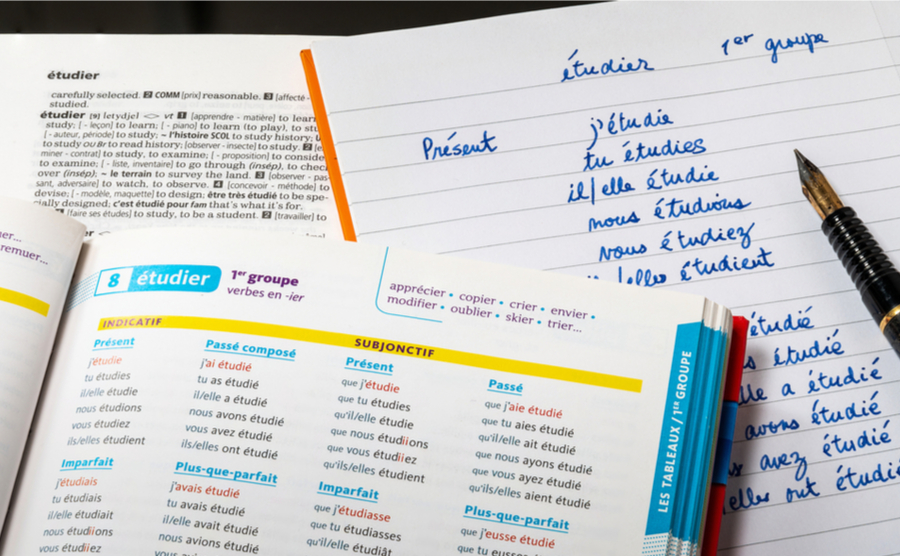
Could it be time to brush up on your French?
Learning French in France
When you continue your learning while living in France, it is important to remember that it’s something of a bureaucratic country. However, maddening this can be at times, you can in fact turn it around and use it to practise your French! If you have to visit the town hall (mairie) to find out about your property, your land, or simply register for any course or local festivity, you can also listen to the way they explain things and the expressions they use.
It can be helpful to steer clear of the English crowd to start with, as this may give you an ‘easy out’ for not learning the language. If you can get past that first hurdle of forcing yourself to speak the language, then you’re halfway there.
Helping children learn French
It must be remembered that any child undertaking their education in France will initially face the challenge of learning French. There are several additional learning support classes for non-French speaking students. You will often also meet other expats in your area who have been through the same challenges. Starting a child early in primary school in France will reap its rewards quickly. They will generally become fluent within six months. You may well be the one asking for guidance from your child!
The younger the child, the more easily they will learn. However, don’t leave it all to the natural process – it’s most important to make sure they read and practise their French whenever possible to speed up the process.
Don’t be afraid of making mistakes!
Remember above all that no-one minds if you make mistakes. Get talking to whoever you can in shops, restaurants, and when sightseeing, and try to strike up a conversation. Tell them that you really want to learn and listen to what they say. Even if you don’t understand everything, the chances are that there will be some words you will understand and that you will get the gist of what is being said to you.
Also, if you listen carefully, you will probably pick up a word or two from the sense of what is being said, which you can store away for future use. The best way to learn French is to be living in France and to have patience. It won’t happen overnight, but in time you will gradually find that you are talking and understanding very well.
Schools in France
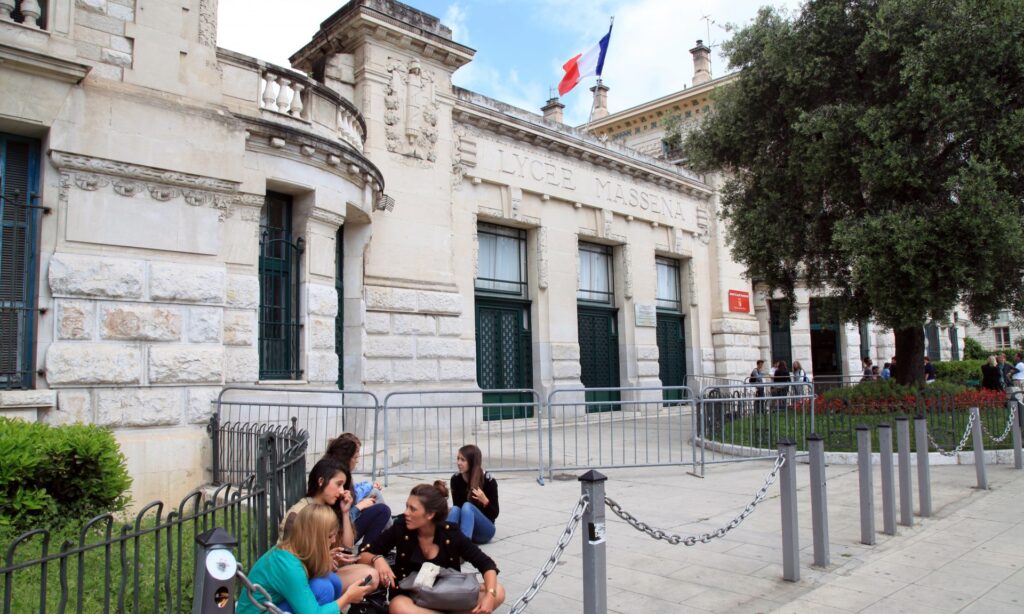
Private schools in France are more affordable than their UK counterparts and are very popular with expats.
For anyone living in France with school-age children, researching French schools will be at the top of your to-do list. It offers one of the best education systems in the world, with an emphasis on academia and discipline.
The education system in France is split into:
- École maternelle: Nursery school, for children aged 3-5 years
- École primaire: Primary school, for children aged 6-10 years
- College: Middle school, for children aged 11-14 years
- Lycée: High school, for children aged 15-18 years
France’s education system is chiefly a very traditional, centralised one, with an unquestionably strong emphasis on academic performance and rigour. State education in France is above all strictly of a secular characteristic. For that reason, the wearing of overt symbols of any religion is forbidden by French law.
All things considered, standards are high and there is a noticeable degree of consistency in French state schools across the country. As with many aspects of French public life, there is above all a great degree of centralisation. Students of the same age will generally be studying the same subjects with the same textbooks, whether they’re in Paris or rural Provence.
All pupils are taught for twenty-four hours a week, chiefly spread over four and a half days. This will generally be on a Monday, Tuesday, Thursday, and Friday, as well as a half day on either Wednesday morning or Saturday afternoon. In French schools, lunch times usually last between one to two hours.
Competencies
In 2005, the French government introduced seven skills that underline teaching across the French schooling system. The expectation is for students to have a command of these skills at the end of their education in France. In theory, they should be able to use them in practice in their potential professional life. These skills are:
- Command of the French language
- Proficiency in a modern foreign language
- Key elements of mathematics, scientific culture, and technology
- Mastery of ordinary information and communication skills
- Humanist culture
- Social and civic skills
- Autonomy and initiative
Teachers assess these competencies at regular intervals throughout the child’s education, until the end of secondary school. The French consider that this emphasis on exams and results will ensure that almost every child will end up with the opportunity to study for a trade, diploma, or degree. Each school has a specialised group of career guidance instructors to help pupils, parents, and teachers to solve problems and assess future goals.
Nursery and primary school
This period of French education is divided into three cycles, with flexibility built into the curriculum so that a child can take more or less time to work through the cycle if necessary. The first years of nursery school (maternelle) for those between three to five is the Cycles des apprentissages premiers. This is then followed by Cycles des apprentissages fondamentaux until they are eight, and the last three years is the Cycles des appronfondissements.
French primary schools tend to have slightly smaller class sizes than many other countries in Europe with around 23 pupils per class[ii], which is especially good news for children new to the language who may need a little extra help. In terms of the curriculum, pupils are taught a good mixture of essential subjects like maths, French, and science, as well as more creative subjects like art, music, and humanities. Pupils are also taught a second language right from when they first enter the French education system.
Collège
Students begin collège at the age of 11, and this lasts until they are 15. At the end, they receive the Diplôme national du brevet, often just known as brevet. This is based on final exams and continuous marking across the final two years of collège.
It has a part to play in the next step – whether they progress to a lycée to study the baccalaureate or follow technical pathways instead. The conseil de classe, made up of the headteacher, teachers, school advisors, parent and student delegates, and school medical staff, is highly influential. It makes the recommendation for the pathway a student will take. It bases its decision on the performance in the brevet, any further evidence and the wishes of the parent and child accordingly. The members are on your side and take their decisions in the best interests of any pupil.
Lycée
At age 18, students sit the famous baccalauréat or colloquially the ‘bac‘. This is the school leaving exam. If your child passes, they will have a free place at any of France’s universities. Conversely to the UK, there are no specific grade requirements.
Unlike with ‘A’-levels, there is no free choice of subjects. Students by and large follow one of three streams (‘S’, scientifique; ‘ES’ economique et sociale; ‘L’, littéraire). Each stream has a different emphasis, with different hours given to different subjects and different options for each one. In line with the centralisation of education in France, all students take the same exams at the same time in one week in June. The exams can be as long as five hours and consist chiefly of essay-based questions.
Higher education
Students progressing onto university in France can access any university in the country if they pass the ‘bac’. The fees are significantly lower than in the UK, normally at just a few hundred euro a semester.
On the other hand, a second, uniquely French option are the grandes écoles. These are unquestionably competitive. Their original function was to train civil servants, and many public functionaries still come from these schools. Students follow a rigorous two years of study just to pass the entrance exam. The graduates of grandes écoles undeniably dominate the high echelons of business, politics and more in French life. Students count as public employees in many schools as soon as they start and get a stipend from the government.
Private and international schools in France
Private schools do exist in France. While they must also adhere to the national curriculum, they do have a more flexible approach to teaching. Likewise, they are more affordable than those in the UK, and consequently very popular with expats. There are also over a hundred international English-speaking schools in France which may be a good option for children struggling to learn the language.
Extra-curriculars
Despite the stricter learning environment, many schools offer a classe de découverte (discovery class), where the school class moves to an outside venue (such as the ski slopes or seaside). French schools don’t have, however, the same level of extra-curricular activities that children from the UK and other European countries might expect. The good news is that there are many clubs and associations outside of school for kids to join. Consequently, it is generally up to the parents to assess which of these their child should choose to spend their time and money on.
Working in France

Do you plan to work in France?
Any expat with a VLS-TS visa or French citizenship can have a career in France. But it’s important to note that working in France can be a very different experience to working in the UK. This isn’t a bad thing though: in fact, there are many benefits French workers have which UK workers don’t. To give you an idea of what to expect when working in France, here we’ll cover the main French labour laws and delve into the work culture.
French work laws
Workplace contracts are important in France, so you should always ensure that you receive one from your employer. The two main forms of work contract you’ll find living in France are:
- Fixed-term contracts (contrat de travail à durée déterminée, or CDD), typically used for temporary roles
- Permanent employment contracts (contrat de travail à durée indéterminée, or CDI), which are more open-ended contracts for permanent employees
Just like in the UK, you will usually be put under a probationary period at the start of your contract to ensure that you’re a good fit for the job. These typically last anything between one to six months. It is standard for employees to be given this probationary period and should not be cause for concern.
While in the UK the standard working week for many is 40 hours, in France working hours for the week are usually 35. In the French workday, workers are entitled to a 20-minute break if they work more than 6 hours, just like in the UK, although the breaks given are usually much longer. If you’re working in France you’re also entitled to sick pay, which is provided by the social security system (la Sécu) rather than your employer.
When it comes to time off, French workplace law is more generous than the UK. French employees are provided with a minimum of 30 days/five weeks paid annual leave, although it’s not uncommon for workplaces to offer six or seven weeks of holiday time instead. This is on top of the 11 public holidays, which many French workers also get off.
If you’re planning an adding a new member to the family while living in France, working mothers are given 16 weeks of maternity leave by French law, and must use a minimum of eight weeks of this leave. For fathers, total paternity leave equates to 28 days: three days of childbirth leave plus 25 days of paternity leave.
For those looking to enjoy retirement in France, it has one of the youngest retirement ages in Europe at just 62 (or 60 if you were born before 1 July 1951). However, you must have reached the required amount of contributions to receive the maximum rate pension.
French work culture
When it comes to work culture, working in France has many bonuses when compared to other European countries. For one, French workers are known for having a healthy work-life balance. They typically spend less time at work than those in the UK, and lunch breaks are often two hours. You’ll also find that most workers go out to enjoy their work break rather than glued to the office chair, eating at their desk. It’s not uncommon to enjoy a full meal with a glass of wine at lunchtime. If you’re new to the country, this is a great time to get to know your colleagues and spend time with some French locals.

Working at the weekend is not permitted in France
However just because there is typically less time spent in the office, this doesn’t mean that little gets done. French workplaces tend to be formal and value punctuality. Time isn’t wasted in meetings and being late is frowned upon by others. French work wear tends to be on the more formal side, and you may find relationships with higher-ups aren’t as warm as they are in the UK, as hierarchy is usually respected in the workplace.
While this may sound like a different workplace than the one you know in the UK, it shouldn’t take long to get used to it. Considering the great work-life balance and the laws in place to protect your employment rights, it’s safe to say that France is one of the best places to work in Europe.
Shopping
Shopping and supermarkets in France are one of the country’s great pleasures. You’ll find they’re generally stocked with high-quality goods, even in chain stores. Opening times do vary from in the UK, and you’ll certainly find it’s a slower and more sociable pastime, especially in rural areas.
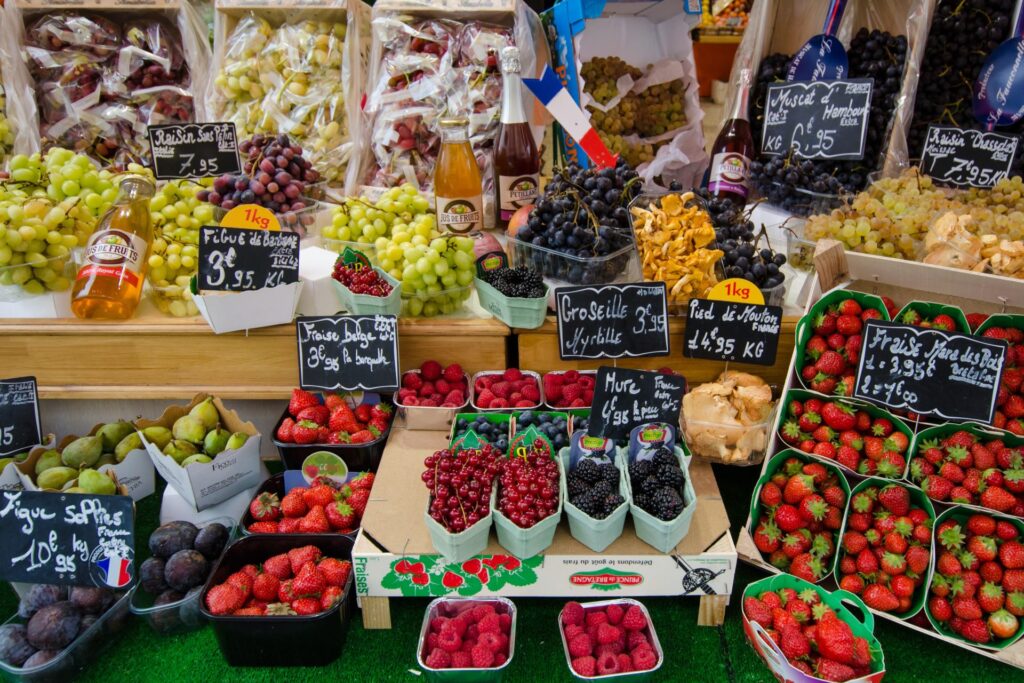
Opening times for shopping and supermarkets in France
Shops in France are usually open on Tuesdays to Saturdays from 9am to 7pm, with a break from 12pm to 2 or 3pm for lunch. You will soon discover that not many shops are open on Mondays in France. Smaller shops can only be open for those five days a week.
However, the larger supermarkets, hypermarkets, and department stores in the larger towns and cities are generally open throughout lunchtime and on Sunday and Monday mornings. These will generally be open from around 8.30am to 8pm.
Opening hours on Sundays will depend on particular shops and specific areas, but you will generally find the local baker, or boulangerie, is open throughout the morning for everyone to get their daily bread on their way home from church. Sunday opening in other shops, contrarily, is more likely to be in the afternoons, after the traditional church service times. Shops were not traditionally allowed to open on Sundays in France. However, a law passed in parliament in 2009 allowed shops to open in the important tourist areas and the major cities of Paris, Lille, and Marseille.
Supermarkets and food shops in France
You’ll unsurprisingly find shops of all sizes in France. At one end of the scale are the large hypermarkets (hypermarchés), which are essentially very large supermarkets. The two main supermarket brands, Auchan and Carrefour, are relatively equal in price, with Auchan being just slightly more expensive. For those looking for a good budget option, E. Leclerc is easily one of the cheapest supermarket chains in France.
Of course, of most interest to expats are the small and independent food shops. And there’s a wealth of them around. You’ll find many towns have a family-owned boulangerie (bakery), boucherie (butcher), épicerie (grocer), and, naturally, a pâtisserie selling delicious traditional French sweet food.
French markets
Much of the local shopping in France is focused on the markets, a historical tradition that still stands the test of time. It is one of the unique pleasures of life in France to stroll around the various markets, eyeing up the fresh produce, or hunting for a bargain at a flea market. The joys of a well-stocked local market and vintage shopping in the local area have become popular throughout the UK in recent years. In France, this form of shopping has always been popular and has been an integral part of the lifestyle for centuries.
Make sure you make it to the local market at least once a week. Shopping in markets is something which is second nature to most French people. It is a social time with people meeting up, buying their wares, and maybe stopping for a coffee afterwards.
Social shopping
Shopping in France is often a sociable event, particularly in rural areas. It is normal to enter a local shop and say ‘bonjour’ to both the shop owner and the other customers. The French usually keep a relatively personal relationship with their local shopkeepers, prompting a better service. This is a great opportunity to practise your French if you’re still getting used to the language.
Food costs in France
When it comes to living costs in France, you’ll find that in general it is somewhat cheaper than in the UK. According to the cost of living campaign compiled by Your Overseas Home, groceries are considerably cheaper in France, compared to the UK.
However, living in France is still not a budget choice as it is one of the more expensive countries to live in in Europe. For more a more in-depth look at prices in France, take a look at Your Overseas Home’s most recent Cost of Living Index.
If you’d like to save a bit on your food costs, make sure to check what’s in season locally as you may find the local produce is surprisingly different to the UK’s. And contrary to popular belief, you can often find better value for money at French markets for even fresher products, so remember to check them out often.
Owning property in France
If you’re planning on buying property in France, you’ll no doubt want to prepare by having all the information you need for keeping your home in top condition. Here, we’ll cover what you need to know about extending and improving your property and finding tradespeople for home upgrades. To find out more about French property taxes and home utilities, check out our guide to moving to France.
Extending your home
When making changes to your property, it is very important to assess the planning rules and regulations of the French legal system. The good news is that you will not need planning permission for any interior alterations you wish to make to your property. For exterior alterations or additions, you will usually find that planning applications are assessed sympathetically. Consequently, unless your plans are obviously not in keeping with what exists, you will often receive the permission you need.
There are certain rules that you must bear in mind at the outset:
- Any exterior alteration/addition/demolition will require a permit
- If you are simply renovating an existing building/barn/shed/garage, you will still need to obtain permission
- Don’t assume that because a neighbour has received permission for something similar, that yours will be automatically granted. Your property may be in a slightly different setting, or regulations may have changed, or indeed the maire (mayor) may have changed!
- Close proximity to a church means that the rules will be more stringent
- A trip at the outset to your local mairie will pay dividends: you need to know what is required so that your application can be prepared properly
- Rules may differ from region to region and sometimes even from village to village, so always seek local advice
There are three different types of permission required for exterior work in the French legal system:
Permis de demolir (permission to demolish)
This will be required if you wish to demolish a building on your land – even if it is in a dilapidated state.
Permis de construire (permission to construct)
This is required for any change to the exterior of the property which may affect its taxable value – including items such as an extension of more than 20m², the change of use of a barn to a habitable residence, the construction of an outbuilding, or enlarging/changing existing windows or doors. This may also be required for changing the colour of external walls or shutters, or creating a terrace or patio.
Declaration de travaux (declaration of work)
This is a simpler form of a building permit; required for minor alterations including:
- An extension of less than 20m²
- Replacing roof tiles
- Building a small swimming pool
- Adding/renewing external doors or windows
Detailed plans, drawings and photographs are required, and you may find it an advantage to employ the services of an architect to ensure that this is correctly drawn up.
Once you have received planning permission in the French legal system, you may go ahead with your plans. Bear in mind that the local authority is at liberty to come and inspect at any time. You will also need to submit a declaration confirming that the work has been carried out according to the permit application and local building regulations within 30 days of the work’s completion.
Getting a tradesperson
No matter how much of a DIY guru you are, at some stage you are probably going to need to find a French tradesperson to work on your home in France.
Finding a French tradesperson

Ask around locally to find the right tradesperson for you.
There can be high penalties for not employing a registered tradesperson. Firstly, you need to find a French tradesperson who is qualified and registered with either the Chambre de Métiers et de l’Artisanat, one of the Chambres de Commerce, Tribunaux de Commerce, the URSSAF, Services Fiscaux or their regional office of the INSEE. To do so, the tradesperson will have to prove that they have the relevant qualifications and a certain amount of work experience. In return, they will be provided with a SIRET number, a 14-digit number from the Chambre de Métiers.
Before you employ your chosen tradesperson, it is always recommended that you ask to see their ‘Carte d’indentification’. This can then be used to prove that they are properly registered – and you can also use their SIREN number (the first 9 digits of their SIRET number) to confirm this on the following websites: Les Echos, Infogreffe, Societe and Manageo. It is very important to be wary of employing anyone who is not registered – and the penalties for doing this are high. Above all, you will also need to ensure that your chosen tradesperson is insured for all their work.
One of the best ways to initially find a French tradesperson is to ask around locally. Speak to any neighbours who have recently had work done for recommendations. You can also speak to your estate agent for a list of recommended contractors. Try firstly to find two or more different tradespeople to assess your requirements, then ask for a written quotation from each one. You may well find that their prices differ, however, it’s not always the best option to simply go for the cheapest one – and that’s above all where a personal recommendation is important.
Paying for services
Once you find your French tradesperson and employ them, you’ll need to consider payment. It is always wise to discuss stage payments (‘paiement échelonné‘). This starts with a deposit and then a payment once each stage has been completed. The last payment comes at the end, when you are satisfied with the completed work. You should also discuss timescales and costs in advance so that you know where you stand. If you need fittings or similar, make sure you discuss whether they can offer you trade prices (‘prix marchand’) from shops for certain items.
By employing a local tradesperson, you should be able to ensure that they are educated in local materials and building methods – as well as the amount of VAT (IVA) applicable. For example, if your house is more than two years old, this will be at the reduced rate of 7% instead of 19.6%. The only difference is, of course, if you are undertaking major reconstruction that would effectively involve turning the property into a new dwelling. Your tradesperson should be able to guide you on whether this is the case.
Once you have accepted your tradesperson’s quotation, they are therefore bound to complete any work in accordance with your written and signed requirements. Generally, French contractors work well and do not scrimp on their hours. On average, they will work a 39-hour week. They usually start very early in the morning and only take time for a one- or two-hour lunch break.
If you’re looking to hire people to help with the upkeep of your property, whether it’s help cleaning your property or work in the garden, make sure to check out our guide on how to find household help in France.
Healthcare
While you’ll hopefully have to access the healthcare system as little as possible while living in France, the good news is that the French system is one of the best ones around. You can find out more about how the healthcare system works and setting yourself up in it with our moving to France guide. Here, we’ll cover the information you need about getting appointments, what they typically involve, and getting prescriptions in France.
Read more about healthcare in France in our article, where in France has good health coverage?

French doctor holding heart with flag of France background.
Doctors’ appointments
If you haven’t already found one, you can use the Doctolib directory to find a suitable doctor near you. Here you can find their availability, prices, languages spoken, and their areas of expertise. If your own doctor uses this service, you can also book an appointment with them here. But if this isn’t an option or you’d still prefer to do it the old fashion way, you can call up the doctors’ office to book an appointment instead. Like in the UK, you may have to explain to the receptionist your issue and symptoms.
There are a few different types of doctors’ offices in France, which are:
- Cabinet individuel (single doctor’s office): For just one general practitioner (médecins généralistes).
- Cabinet de groupe (medical groups): Here you’ll find multiple GPs under one roof.
- Maison de santé pluriprofessionnelle (medical group multispecialty care): Large establishments with access to general practitioners, dentists, nurses, and more.
You’ll find a maison de santé pluriprofessionnelle in cities, but in towns you will more commonly find cabinet de groups, and cabinet individual in more rural areas.
When you head to your appointment, don’t forget to bring your carte vitale, as doctors will ask for this as soon as you sit down. You will typically have to wait a while after your scheduled appointment time, as is often the case in the UK. Don’t be surprised if you end up waiting upwards of 20 minutes.
For the appointment itself, it won’t be too different to one in the UK. You will explain your issue and symptoms, the doctor will examine you thoroughly, and recommend their best course of action. Then all that’s left to do is pay. While the French healthcare system will cover the cost of your appointment partially, you will still be expected to cover your share, which normally comes to around €25.
If you’re looking for an easy way to keep track of your appointments, good news! Anyone with a carte vitale now has access to a new digital health portal, Mon Espace Santé. Read our article on the portal to find out what you can use it for.
Prescriptions
If your médecins généralistes recommends medication, they will provide you with a prescription in your appointment. Simply take this to your local pharmacy and they will give you the medication you need. It’s worth noting that for repeat prescriptions, you will only be provided with a month’s worth of medication at a time.
Local pharmacies follow the same opening hours as other shops, which is from 9am to 7pm, Tuesday to Saturday, with a break from 12pm to 2pm or 3pm for lunch. They do not traditionally stay open all hours. That said, in the towns there is likely to be at least one pharmacy that stays open in the evenings and on Sundays. There are also a few 24-hour pharmacies to be found in the larger towns and cities.
Dentists in France
Just like doctor’s appointments, dental care is partially covered by the French state healthcare system. Most choose to get the rest of the cost covered with dental insurance. The cost of a standard yearly dental check-up is (on average) €34, but work like fillings and scaling costs extra. And like in the UK, dentist appointments are free for children up to the age of 18. However, it’s worth noting that these free check-ups are only scheduled every three years.
When it comes to making an appointment, you can do so online using the Doctolib directory, or by calling up the dentist directly. Bear in mind that there are often long wait times for appointments, and you may not be able to make an appointment any sooner than a few months away. Try to book them well in advance so you don’t end up paying extra for emergency costs for issues which could’ve been prevented at your check up!
Emergency healthcare in France
If you need an ambulance, dial 15 to access the main ambulance service in France, Services d’Aide Médicale Urgente (SAMU). You can also call 112, which is a free European emergency number you can access in any EU country. The cost of using SAMU in an emergency will be fully covered by the French healthcare system and you won’t have to pay in these circumstances.
If you choose to take yourself (or the ill/injured party) to hospital, make sure that the one you’re going to has an A&E department, as not all do. It may be best to ring to check before you make the journey, and it’s always worth preparing before an emergency arises by making a note of all this information to have to hand.
Leisure in France

French alps ski resort
Whether you want to find a new hobby, enjoy your favourite pastime, or simply make new friends while living in France, you’ll no doubt be interested in finding out more about your local leisure activities. The good news is that there are several different ways to have fun in France and get involved with the local community through various clubs.
Sports
Living in France, even in retirement, offers the opportunity to try new sports and take up active hobbies. The French climate and longer hours of sunshine all help make it a great place for doing sport. There is more space than in the UK and the French government has invested heavily in sporting infrastructure.
If you are coming to live in France and already have a particular sport or pastime that you love, you’ll soon find like-minded folk. If you’re taking the opportunity to find a new activity, you’ll be spoiled for choice. From the high-energy of running events, surfing, and off-piste skiing, to a quiet game of boule in the village square, there’s no excuse for being bored. Anyone is welcome to join in, so give it a try. Here are a few of our favourite sports and leisure pastimes in France.
Surfing
Don’t think that surfing is all about the kids. Surfing is becoming increasingly popular among older generations. Older women have been encouraged by holiday companies offering women-only surf lessons, while improvements in wetsuit technology mean no-one need to be freezing cold in the water anymore.
Skiing
France’s skiing resorts are second to none. In terms of variety of terrain, quality of facilities and snowfall, they offer everything you could hope for, and they’re even within driving distance of the Channel ports.
They’re not cheap though. For a ski-in, ski-out chalet high enough to guarantee snow, you’ll normally need at least €400,000, even in the cheaper resorts. On the plus side, you do get four seasons of fun, with walking, mountaineering and paragliding all popular pastimes in the Alps in summer. Read our guide to the best rated ski resorts to find the perfect place for you.
On the water
Most French rivers have kayaking centres, or just do without the boat and try “canyoning”. French rivers being cleaner than those most of us are used to, river swimming is a popular outdoor activity. You’ll often see inland lidos too, where you can dive down among the reeds and frogs. Just remember that many ban shorts-style trunks so you’ll have to opt for speedos!
Both river and sea fishing are popular leisure pursuits in France. France caters for all types of fishing, with a vast variety of rivers, lakes and coastal waters in which to fish. Carp fishing is popular and available to all, so many keen anglers may find that they choose their home in France according to its proximity to a local carp fishing lake. Check out some property options near lakes here.
Other popular options on the water are of course stand-up paddleboarding, windsurfing, kitesurfing, or just good old yachting. There is no shortage of marina spaces in France, and you can sail via the Canal du Midi from Bay of Biscay to the Mediterranean.
Football
The French love football. With some of the world’s greatest players in its club sides, and with the national team winning (another!) World Cup in 2018 and coming 2nd in 2022, can you blame them? France has invested in its football at grass roots level, literally, with far more all-weather pitches than in the UK. So, wherever you live in France, look up the local pitch and you should find a team to join.
Tennis
Tennis is also extremely popular in France, with the best clay court players in the world converging on the Roland Garros courts in Paris in springtime. As mentioned, France has over 9,000 tennis clubs, so you’ll never be short of a partner or a nearby court.
Cycling
You can’t talk about sports in France without mentioning cycling. Every year after the Tour de France, you are likely to see endless serious cyclists taking to the roads all over the country. The first Tour de France was held in 1903 – each race lasts for three gruelling weeks, with the participants having to cross some treacherous terrain.
But you don’t need to leave it to the pros. A popular pastime is to ride the same course the day before (or after). France has around 21,000 kilometres of cycle paths, compared to the UK’s 14,000 kilometres. It also has some outstanding long-distance trails, such as Eurovelo 1, which travels 1,200km down the entire west coast of the country.
Other clubs
If you aren’t the sporty type or you’re looking for another less physical club to get involved in, you shouldn’t struggle to find other activities to enjoy. You can ask your neighbours, head to your local Mairie, or look online to find more information about the different groups near you. Clubs you may find could include art clubs, book clubs, music clubs, drama clubs, and even more niche options, like knitting clubs.
You may also be able to find clubs especially for British expats depending on the area you’re in. Expat organisations like amateur dramatics, walking groups, and art classes run by Britons for Britons are another great way of meeting like-minded people. While this is a good way to make new friends, don’t just rely on expat groups as it’s important to integrate with the rest of the French community too.
Homesickness
Even if France is your dream place to live, it’s inevitable that there will be moments where you find yourself dealing with homesickness. Although France is our closest neighbour, moving to a new country with a different language and different way of doing things can be difficult at first – even if it eventually turns out to be immensely rewarding. Use these tips if you’re ever feeling homesick in France to enjoy your experience of living in a new country as much as you can.
Take advantage of your ‘foreignness’
France is very different to the UK. Firstly, it’s larger, with more open spaces, bigger and cheaper houses. Secondly, you’ve got spectacular scenery and, in general, a more laidback lifestyle (especially in the rural parts). Don’t presume that you will immediately get used to these changes and your new life. Instead, ask questions and speak to the locals. They will be interested in you and will understand that your life is very different. They will often then go out of their way to help you in dealing with homesickness in France.
Pursue a hobby or join a group
If you have an interest, such as singing, playing sports, or anything else, find your nearest classes or groups and sign up. Likewise, if you are religious, why not look for your nearest church or other place of worship? By doing this you are likely to meet people with whom you have something in common, and who you can hopefully build friendships with. Having a strong friendship group is so useful in dealing with homesickness.
Find an expat community
Most cities, and many smaller towns, are home to expat communities. Here, you will be able to speak to people in the same situation as you, discuss experiences and share notes. This is the sort of thing that can create strong bonds and help you overcome homesickness.
Get stuck in with your French community
Becoming integrated into your new community in France is a vital part of making your new home into a happy one, be it a permanent or a second residence. Being in France means accepting the French way of life, their culture, and habits. Getting out and about and meeting French natives in cafes, restaurants, shops, at fetes, concerts and at the local market is a great way to develop a network of friends and acquaintances.
Accept that homesickness is normal
There is no time limit on how long it could take for you to feel settled into your new life in France. Even after months have passed, you may find that there are days when you yearn for the UK. Try to remember that it is completely normal. Focus on embracing the differences between the two countries and make the most of all that France has to offer you.
If you’ve already made the move or you’re planning on relocating in the near future, you’re sure to enjoy your time living in France. From shopping in French markets and enjoying leisure activities to the excellent work-life balance, you won’t regret making a home here.
To fully prepare yourself for French life, make sure to check out our essential guide to financing your move to France, as well as our guides on moving to France and buying French property. You can also check out our French news section to keep up to date with the latest essential information for expats.
And if you’re still in the process of property hunting, we have a fantastic selection on offer in areas across the country, including Brittany, Normandy, Cote d’Azur, Occitanie, and Pays-de-la-Loire. Explore our collection of properties in popular French regions for your relocation today.
Whatever information you’re searching for, we’re here to help you find it
Download our free expert guides to make your move a success
Finance Guide – Learn more about financing your new home, and life, in France and making a French property more affordable.
Healthcare Abroad – Taking care of your health doesn't stop when moving to France. Get this one stop shop for expatriate healthcare.
Your Negotiation Guide – A handy guide to everything you need to know about negotiating for a property in France.
A Property Buyer's Guide to Currency – A currency specialist’s ‘insider’s guide’ to a successful property purchase, written by the experts.

Yasmin Smith,
France Buying Specialist
Speak to an expert
If you need assistance with your move, we have a team of France property experts that can help at every crucial stage. Contact us on +44 (0)20 7898 0549 from Monday–Friday, 8:30am–6:00pm or email [email protected].
Whether you need quick advice over the phone or assistance when organising your viewing trip, we can help. Our team of experts can also assist you in finding the professionals you need to complete the purchase of your dream home and to dodge the common pitfalls of buying property in France.
We can use our trusted network to put you in touch with:
Get in touch with us via the details above or fill in an enquiry form to get started.

The France Buying Guide walks you step-by-step through each stage of the property buying process in France, with practical recommendations from our experts who have been through the process themselves. The guide will also help you to:



